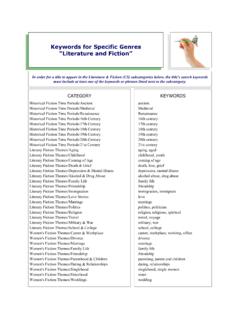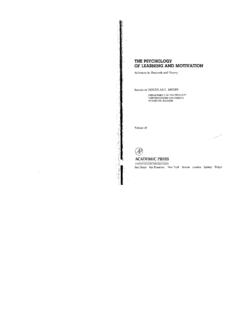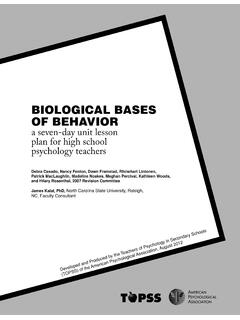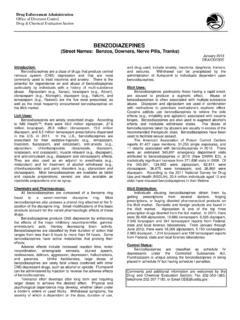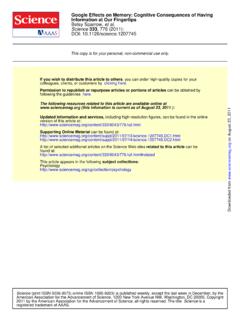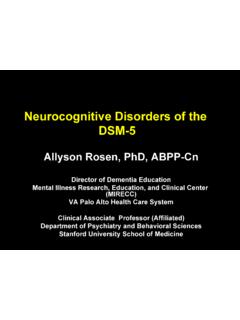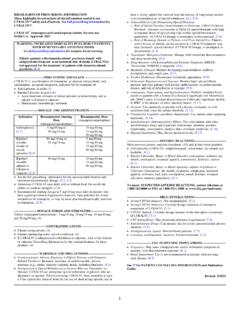Transcription of SAMPLE TEACHING STATEMENT - University of Kansas
1 SAMPLE TEACHING STATEMENT My goal in TEACHING is to foster the acquisition of a base of concepts and learning skills to facilitate further learning and thinking. In all of my courses I guide students in the evaluation of evidence, critical thinking, argument development, verbal and written expression, and the application of general principles to novel settings. These competencies will equip students for a broad range of demands in future academic and occupational settings. Of course, I also expect my students to attain a high level of scholarship in specific content areas, especially in graduate courses in which course content is directly relevant to students careers.
2 To promote the development of general thinking and learning skills, as well as facilitate an understanding of course content, all of my courses are structured around three common themes: an emphasis on psychological research, the development of writing skills and the generation of enthusiasm for scientific inquiry. Exposure to research literature is an integral part of my course plans, in part because comprehension of course material is enhanced by an understanding of the methods used to discover that information. Moreover, an emphasis on the discovery of knowledge fosters an appreciation of research design and methodology, and more generally, of the importance of critical evaluation.
3 These skills make students thoughtful consumers of scientific ideas presented in both academic and popular media sources. As I indicate in my research STATEMENT , I have investigated this issue in a collaborative research project on science learning in undergraduate students. To familiarize students with research, my lectures always cover the methodology by which principles are discovered. I also introduce research by including primary sources in the required course reading material, and organizing occasional in-class activities around one or two such sources. For instance, in my undergraduate Cognitive Development course, we spend one class period reading, summarizing and critiquing an empirical article published in Nature on numerical understanding in human infants.
4 Similarly, in my undergraduate Memory and Testimony in Children class, I introduce students to the scientific controversy over the relation between stress and memory by assigning half of the students an empirical paper suggesting a positive relation between stress and memory, and assigning the other half an article suggesting a negative association. During the next class period, students are organized into small groups and asked to explain their assigned articles to each other, analyze differences in methodology and results, explain the discrepancies between the two investigations, and come up with a feasible model of the relation between stress and memory.
5 These sorts of activities not only provide students with exposure to the empirical literature in developmental and cognitive psychology, but promote the development of skills in critical thinking and argument development. Finally, I also provide first-hand research experience through frequent in-class demonstrations and assignments outside the classroom. Indeed, in my course Memory and Testimony in Children, almost every class period includes one or two simple memory experiments exploring topics in classical and modern models of memory. Writing proficiency is a critical component of a University education, and all of my courses (even my Child Psychology class, which has well over 400 students) involve writing assignments and a variety of examination question types.
6 In Child Psychology, I typically assign two to four brief application papers, in response to a question related to the course material ( , after reading a section in the text about premature infants, indicate what you might tell a close cousin who had a baby two months prematurely about her child s chances for normal development). These papers are designed to prompt students to apply course material to settings outside the class, and in doing so reinforce important concepts. Students in my undergraduate Cognitive Development and Memory and Testimony classes, as well as those in my graduate courses, write more extensive research papers.
7 But not all of my students arrive in my classroom equipped with excellent writing skills, so rather than using writing solely as a form of evaluation, I teach students the process of writing. With all writing assignments, I encourage students to take advantage of the writing centers on campus and to submit rough drafts so that I can provide constructive feedback, and I sometimes give students the opportunity to rewrite their final papers for additional credit. In addition to these more formal projects, I use briefer in-class writing assignments to help students synthesize and critically evaluate information.
8 For instance, to prepare my Cognitive Development students for a discussion of several controversial theories of intelligence, I ask them to spend a few minutes writing about their own definitions of intelligence. Similarly, following a discussion of the role of experience in brain development, I asked students to write a response to a comment about whether the field of Psychology will ever be reducible to biology alone. My courses are also designed to generate enthusiasm for science and the process of scientific inquiry. Meeting this objective is particularly complicated in my undergraduate and graduate Cognitive Development courses and my graduate History and Systems of Psychology: Developmental Theory course, which have been service courses taken primarily by students from outside the discipline to fulfill a curriculum requirement.
9 The challenge is to stimulate curiosity, as well as learning, by linking material to students existing knowledge and experience. My approach is informed by research on memory and cognition (including some of my own research), which shows that memory is enhanced when to-be-remembered information is familiar and meaningful. I always supplement lectures with structured discussions, demonstrations, or cooperative learning activities that encourage students to think actively about the material and relate to it personally and practically. For example, in my undergraduate Child Psychology and Cognitive Development courses, I frequently use demonstrations with real children (live and videotaped) to illustrate principles of development and the methodology that documents them.
10 In my undergraduate classes, I also assign brief writing assignments to connect information presented in class to students intuitive knowledge. For instance, students in Memory and Testimony and Children write a brief essay on their earliest memory and analyze the characteristics of the remembered event. They then shared their analyses during a class discussion on infantile amnesia and the emergence of autobiographical memory. Assignments in my graduate courses are designed to be useful and to relate the material to students work in their own disciplines. In my graduate course, History and Systems of Psychology: Developmental Theory, students choose a content area related to Developmental Psychology and analyze either the current or historical theoretical approaches to that content area.


